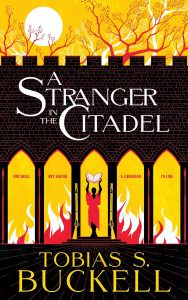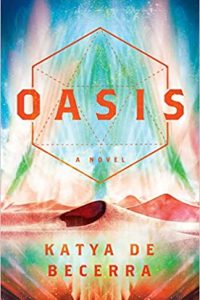Gary K. Wolfe Reviews A Stranger in the Citadel by Tobias S. Buckell
 A Stranger in the Citadel, Tobias S. Buckell (Audible Originals 978-1713646228, $24.99, CD, 7 hr., unabridged [also available as a digital download]) September 2021. (Tachyon 978-1-61696-398-9, $17.98, 256pp, tp) October 2023.
A Stranger in the Citadel, Tobias S. Buckell (Audible Originals 978-1713646228, $24.99, CD, 7 hr., unabridged [also available as a digital download]) September 2021. (Tachyon 978-1-61696-398-9, $17.98, 256pp, tp) October 2023.
Far-future societies which have forgotten or mythologized their history have been a staple of SF at least since H.G. Wells’s Eloi. If you shift the point of view from that of a visiting time traveler to an inhabitant of such a society, you’re getting pretty close to what has sometimes been called science fantasy (in one of its many vague definitions): a story set in an apparently magical world, but which is gradually revealed to be our own distant future. The epic masterpiece of this sort of storytelling is Gene Wolfe’s Solar Cycle (beginning with The Book of the New Sun in 1980-83), but the technique is useful in all sorts of other ways. Tobias S. Buckell’s A Stranger in the Citadel begins in the ancient walled city Ninetha, cut off for generations from the outside world, ruled by a family dynasty of uncertain provenance, supplied by an apparently magical resource called a cornucopia, and governed by the overriding commandment ‘‘You shall not suffer a librarian to live.’’ Long before thinly veiled allusions to writers as diverse as Lewis Carroll, Alexandre Dumas, and Langston Hughes make it unmistakably clear, we come to understand that this antiliterate society, where books and writing are outlawed, is not a fantasy world at all, but rather a distant descendant of Bradbury’s Fahrenheit 451, a point made explicit in Buckell’s afterword.
When a rare traveler named Ishmael is captured carrying a book, the narrator Lilith – the youngest daughter of the city’s ruler or ‘‘Lord Musketeer’’ – saves him from immediate execution at the hands of Kira, the commander of the city’s Guardians. This proves to be the first sign of a growing schism with Kira, who has virtually been Lilith’s surrogate mother her entire life. As Lilith begins visiting the imprisoned Ishmael, Kira grows more imperious and arrogant, leading to an argument in which Lilith impulsively reveals a secret about her father which leads Kira – seemingly in a matter of hours – to mount a violent rebellion that eventually installs her as regent, at the expense of Kira’s entire family. Soon Lilith finds herself in exile with Ishmael, fleeing across the wastes outside the city and inevitably discovering that her world is not at all what she thought it was, that there are other cities, fearsome remnants of ancient technology, and even a rather startling surprise when she finally reaches what she believes to be the edge of the world.
The contrast between Lilith’s innocence – or enforced ignorance – and Ishmael’s rationality is skillfully handled, as he tries to explain to her a few rudiments of science and even mentions ‘‘griots’’ whose task was to keep literature and knowledge alive by memorizing entire books (as at the end of Bradbury’s novel). As vivid as Buckell’s settings and characters are – and Kira especially is a real piece of work, far more complex than she at first seems – the sense of how this world evolved, and how it relates to repressive trends in our own world, is never made particularly clear (Bradbury at least had HUAC and anticommunist hysteria to fall back on). A Stranger in the Citadel thus emerges as a well-told and at times provocative addition to the long SF tradition of tales of postrationalist dystopias who blame scientists and intellectuals for their plight (a tradition that includes such classics as Walter Miller’s A Canticle for Leibowitz and Leigh Brackett’s The Long Tomorrow). And although book-burning and government-sanctioned rewriting of history seems more ominous now than at almost any time since Bradbury’s classic first appeared, Buckell’s far-future setting takes just a bit off the edge of immediacy that his theme invites. It’s a solid adventure with a winning protagonist, but one that is not quite as chilling as it might be in our particular moment.
Gary K. Wolfe is Emeritus Professor of Humanities at Roosevelt University and a reviewer for Locus magazine since 1991. His reviews have been collected in Soundings (BSFA Award 2006; Hugo nominee), Bearings (Hugo nominee 2011), and Sightings (2011), and his Evaporating Genres: Essays on Fantastic Literature (Wesleyan) received the Locus Award in 2012. Earlier books include The Known and the Unknown: The Iconography of Science Fiction (Eaton Award, 1981), Harlan Ellison: The Edge of Forever (with Ellen Weil, 2002), and David Lindsay (1982). For the Library of America, he edited American Science Fiction: Nine Classic Novels of the 1950s in 2012, with a similar set for the 1960s forthcoming. He has received the Pilgrim Award from the Science Fiction Research Association, the Distinguished Scholarship Award from the International Association for the Fantastic in the Arts, and a Special World Fantasy Award for criticism. His 24-lecture series How Great Science Fiction Works appeared from The Great Courses in 2016. He has received six Hugo nominations, two for his reviews collections and four for The Coode Street Podcast, which he has co-hosted with Jonathan Strahan for more than 300 episodes. He lives in Chicago.
This review and more like it in the October 2023 issue of Locus.
 While you are here, please take a moment to support Locus with a one-time or recurring donation. We rely on reader donations to keep the magazine and site going, and would like to keep the site paywall free, but WE NEED YOUR FINANCIAL SUPPORT to continue quality coverage of the science fiction and fantasy field.
While you are here, please take a moment to support Locus with a one-time or recurring donation. We rely on reader donations to keep the magazine and site going, and would like to keep the site paywall free, but WE NEED YOUR FINANCIAL SUPPORT to continue quality coverage of the science fiction and fantasy field.
©Locus Magazine. Copyrighted material may not be republished without permission of LSFF.







